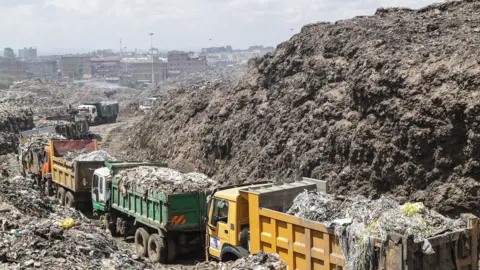The recent global talks aimed at developing a comprehensive treaty to combat plastic pollution have unfortunately collapsed, leaving participating nations in a state of deep division. This sixth round of negotiations, which have been ongoing for nearly three years under the auspices of the United Nations, was scheduled to conclude on Thursday. However, despite continued discussions that extended into the night, no agreement was reached. The event highlighted a persistent chasm between a coalition of around 100 nations advocating for production constraints on plastic and countries that rely heavily on oil and gas, such as Saudi Arabia and Russia, who prefer a focus on recycling as a solution.
Cuban delegates expressed disappointment early in the morning, indicating that nations had collectively missed an essential opportunity for global environmental advancement. At the same time, UK Marine Minister Emma Hardy conveyed her disappointment, emphasizing the shared responsibility that all countries bear in tackling the “global crisis” of plastic pollution. She reiterated the UK’s commitment to creating a collaborative environment that fosters sustainable practices and a circular economy.
These talks were initiated in 2022 as a direct response to alarmingly increasing evidence regarding the dangers of plastic pollution. Scientists warn that the potential toxicity of the chemicals leaching from plastics, especially microplastics, can have detrimental effects on human health and the environment. These particles have been found in soils, waterways, and even human organs, amplifying the urgency for swift action. Although countries were originally tasked with finalizing an agreement by December of the previous year, that deadline has now lapsed, further postponing any significant progress.
Representatives from island nations, particularly the northern Pacific nation of Palau, voiced their frustrations, articulating the disappointment of repeatedly returning with insufficient progress for their constituencies. They emphasized the injustice of facing the brunt of an environmental crisis despite their minimal contributions to the problem.
The crux of the negotiations remained centered on whether the treaty should focus on curbing plastic production at the source or managing the repercussions of pollution. Oil-rich nations like Saudi Arabia view the integration of plastics, derived from fossil fuels, as integral to their economic futures, especially amid the global shift towards renewable energy sources. They advocate for improvements in waste management and recycling infrastructure as the optimal strategy to address plastic waste. This view is corroborated by industry stakeholders; Ross Eisenberg, president of America’s Plastic Makers, emphasized that prioritizing pollution management over production reduction could prevent unintended consequences of substituting plastics with alternative materials.
However, critics, including researchers and environmental advocates, argue that this strategy fails to address the systemic issues inherent in plastic production and waste. Current global recycling rates hover around merely 10%, a figure that presents severe limitations in overcoming plastic pollution’s environmental impacts. Dr. Costas Velis, an associate professor at Imperial College London, stated that relying solely on enhanced recycling will not resolve the plastic crisis.
Proponents of reducing plastic production argue that structural changes are vital. Countries like the UK and those in the European Union have been pushing for treaty terms that include tighter production regulations and unified global standards to simplify recycling processes. Their strategies include design improvements that enhance recyclability, such as mandating uniform colors for plastic bottles, which would significantly boost their value.
Nonetheless, negotiations reached a standstill when the latest chair, Luis Vayas from Ecuador, proposed a text that favored neither production cuts nor explicit commitments to recycling improvements. The European Union found some value in the proposed text, describing it as a positive basis for future discussions. In stark contrast, oil-dependent nations expressed their dissatisfaction, feeling misrepresented by the outcomes of the negotiations.
Environmental groups expressed outrage at the collapse of the talks and criticized the prioritization of profit-driven interests over environmental health. Graham Forbes, representing Greenpeace, asserted that the inability to reach consensus must serve as an urgent wake-up call acknowledging that addressing plastic pollution necessitates confronting fossil fuel interests directly.
Ultimately, the chair announced that discussions would resume at a later date, but this moment further underlines the complexities of reaching a collective and effective environmental agreement amid varying national interests and priorities.












